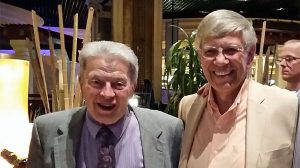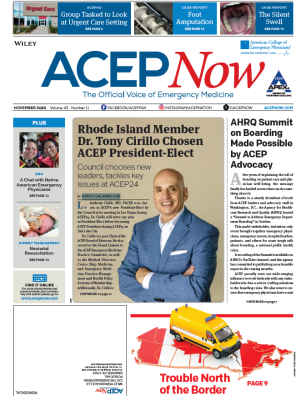KK: I’m honored to be talking to someone who’s been a member for 50 years. You filed your membership application Nov. 1968. Do you remember joining?
SS: Oh, yes. I helped start the first ER group at Reading Hospital in 1967. They were seeing 12,000 patients a year then and now they are the busiest emergency department in the state of Pennsylvania. They see 135,000 patients a year. That growth at the Reading Hospital reflects the growth in emergency medicine in general.
KK: When you joined ACEP, was it from a sense of obligation to the specialty, or did you think there would be value in the services provided from membership?
SS: It was Wiegenstein who founded ACEP back in about ‘68 or so. I thought that we were going to need to become a specialty and I wanted to be part of the group that was pushing to have us become a specialty.
When I was a fourth-year medical student at Temple University in Philadelphia, we were the interns. The next highest house officer was first-year resident. My duty station in Aug. 28–30, 1964, was the emergency room. That’s when they had the race riots in Philadelphia. This was baptism by fire in emergency medicine. That’s when I chose emergency medicine as my specialty.
One of the advantages of emergency medicine is you get to see a patient and you can become their advocate and do something for them that maybe somebody else is not doing.
KK: Through the course of 50 years, you have renewed your membership. Why?
SS: This was my organization and I tried to go to all of our national conferences. I really enjoyed the national meetings. They had the best speakers in the country. People like Corey Slovis and, of course, Greg Henry.
KK: Can you give us a sense, from ‘67 when you started your group and ‘68 when you joined ACEP, of some of the changes you’ve seen in the specialty?
SS: There have been a lot of treatment changes over the years and that’s another advantage of going to ACEP and picking up new ways of approaching things.
KK: Apparently you were a wonderful role model because your son decided to follow in your footsteps.
SS: I remember him going through medical school and then talking to me about becoming a surgical resident. I told him, “Sam, one of the advantages of emergency medicine is you get to see a patient and you can become their advocate and do something for them that maybe somebody else is not doing.” I think he took that to heart and decided to go into emergency medicine.
KK: Are you still practicing emergency medicine?
SS: Yes, I am.
KK: That is impressive. Yours is one of the longest careers I have heard about. You mentioned turf battles. What’s one of the pivotal turf battles that you won at your institution that moved emergency medicine in the right direction?
SS: Initially we had to be a subspecialty of surgery, but we were able to get ourselves separated as a separate specialty from surgery.
KK: Tell us about your challenges with the surgeons.
SS: They just thought that we needed to be their stepchild, and that they had been around much longer and had a lot longer established specialty. I said, “We’re a new specialty and we’re going to continue to grow and do things for people that can’t be done otherwise.” Doctors weren’t making house calls anymore. Instead, they would refer patients to the emergency room for us to take care of.
I convinced them we were a vertical specialty, we specialized in the emergency medical aspects of every specialty, and we can do that better than anybody else.
KK: Why should young emergency physicians join ACEP?
SS: I think this is the best way of coming in contact with their peers at the national meetings and through the publications of ACEP.
KK: Thank you for helping to create a specialty that has fulfilled many lives, and heartfelt thanks for your 50 years of membership.
SS: I’m very honored to contribute and share my thoughts today.
Pages: 1 2 3 | Multi-Page





No Responses to “Words of Wisdom from ACEP’s Longest Tenured Member, Dr. Samuel Slimmer”